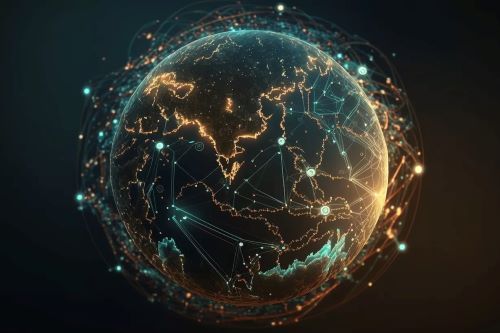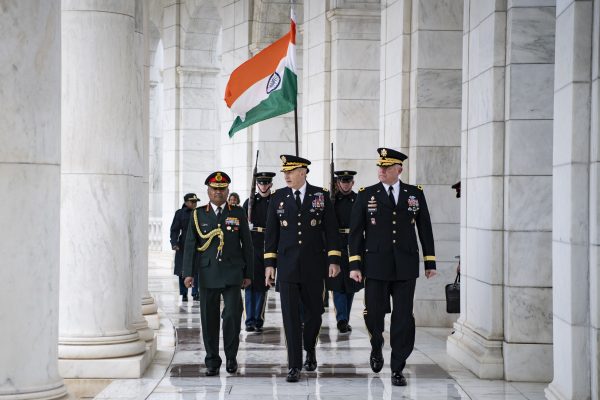India's Urban Prospects: An Examining Examination of Election Proposals
(06-May-2024)
India's Urban Prospects: An Examining Examination of Election Proposals

Voters can learn a great deal about the aims and policies of political parties from their election manifestos. The manifestos of the two main national parties, the Indian National Congress (INC) and the Bharatiya Janata Party (BJP), have been closely examined in relation to the elections scheduled for 2024 in India, with special attention paid to their promises regarding metropolitan areas.
Election manifesto promises, however, are not legally binding in India; the people have the last say on this matter.
The purpose of this analysis is to shed light on how cities will develop under either party's leadership. Both manifestos outline lofty objectives for urban growth, but they also ignore several very important concerns, mainly related to the functional and financial spheres of urban local bodies (ULBs) and ongoing urban reforms.
An analysis of the Indian National Congress's manifesto (INC)
The Program for Urban Employment and Infrastructure Renewal
The 'Nyay Patra' (NP) manifesto of the INC highlights the necessity of an urban employment program that would rebuild and revitalize urban infrastructure in order to create jobs for the urban poor. This program is modeled after the prosperous urban employment program that was introduced in Rajasthan in 2022 and gave the urban poor 100 days of work each year. While praiseworthy, questions persist about the program's financing sources and operational difficulties.
Control of Urban Growth
The NP suggests limiting the growth of current cities and encouraging the development of twin cities next to current ones, with a zone designated for no-construction standing between them. Although the goal of preventing uncontrolled urban development is praiseworthy, there are concerns about the viability and efficacy of this strategy, particularly with regard to enforcement and regional differences in the rates of urbanization.
Reforms in Urban Governance
The manifesto proposes empowering councils with executive, financial, and administrative authority in addition to direct elections of mayors and chairs for fixed five-year terms. Effective urban governance necessitates the empowerment of local governments; however, the constitutional and practical obstacles to enacting such reforms at the federal level are yet unknown.
Connectivity and Infrastructure
One of the main goals of the NP is to improve transportation infrastructure and communication between rural and urban areas. The manifesto emphasizes the need to solve problems like the number of stray dogs in cities and pledges a thorough plan for secure multimodal urban public transportation. However, strong implementation plans and funding commitments are needed to turn these pledges into real changes.
Putting Constitutional Amendments into Practice
The NP promises to support the full application of the Constitution's 74th Amendment, which gives local governments more authority. However, guaranteeing successful implementation continues to be a major difficulty due to governments' past unwillingness to abide by constitutional demands.
Study of the Bharatiya Janata Party's Manifesto
Encouragement of Low-Cost Housing
'Sankalp Patra' (SP), the BJP manifesto, places emphasis on bolstering regulatory frameworks like the Real Estate (Regulation and Development) Act (RERA) in order to promote affordable housing. Although this project fills a vital gap, substantial land use and rent control reforms are also necessary for long-term urban housing solutions.
Establishment of Satellite Townships and Development of Infrastructure
In an effort to reduce urban congestion and advance balanced regional development, the SP supports the establishment of new satellite townships close to major cities. But as with the INC's idea, issues with execution and regional differences in development must be addressed.
Sustainable Development and Transportation
The implementation of AI technology for traffic control and the development of integrated metropolitan transport systems are prioritized in the manifesto. Furthermore, programs that support water-secure communities and increase the fleets of electric buses demonstrate a dedication to sustainable urban development. However, these projects' funding sources and scalability need to be carefully considered.
Partnerships for Infrastructure and Environmental Preservation
In order to rejuvenate urban environments, the SP emphasizes the significance of infrastructure collaborations between the federal government, states, and cities. In addition, the emphasis on creating green areas, revitalizing bodies of water, and closing open landfills is consistent with the objectives of environmental preservation. Nonetheless, there are still significant obstacles to overcome, such as distributing resources fairly and addressing socioeconomic differences in access to facilities.
Urban Governance Modernization
The manifesto suggests updating urban regulations, procedures, and governing frameworks to encourage effective management and planning. A commitment to institutional improvements is shown in initiatives like developing digital urban land record systems and improving urban governance education. However, local capacity-building initiatives and stakeholder participation are necessary for these strategies to be effective.
Enduring Difficulties and Unresolved Issues
- Mechanisms for Implementation and Sources of Funding: Although the manifestos contain some encouraging ideas, questions remain about how these projects will be carried out and funded. The lack of specific information regarding the financing sources and methods of implementation raises questions about the viability of the suggested urban development projects.
- Coordination of Stakeholders: All parties involved in urban development, including governmental bodies, businesses, and civil society organizations, must work together seamlessly. The manifestos, however, leave a crucial hole in the implementation process since they do not provide specific tactics for encouraging this kind of cooperation.
- Concrete Reform Ideas: One major omission in both manifestos is the inclusion of specific reform ideas to address long-standing urban issues. To ensure sustainable urban growth and development, comprehensive reform plans are required for critical concerns such infrastructure development, urban governance, and regulatory frameworks.
- Enhancing ULB Financial Autonomy: Good governance and service delivery in urban areas depend on ULBs having sufficient financial autonomy. The manifestos, however, don't include any concrete pledges to increase ULBs' financial independence, which raises questions about their capacity to independently carry out and maintain urban development projects.
In summary
The manifestos of the BJP and the INC both lay out expansive plans for urban development that include sustainability, governance, and infrastructure. Still, there are a number of significant issues and open questions. Political parties must give comprehensive and inclusive urban policies that address the various demands and challenges of urban inhabitants top priority as India's population continues to grow at an accelerated rate. India's cities have to work together and remain committed if they are to become the growth, innovation, and inclusive development hubs that they can be.
India's Rising Worldwide and Falling Regionally in Modern Geopolitics
(06-May-2024)
India's Rising Worldwide and Falling Regionally in Modern Geopolitics

India's foreign policy is paradoxical in that its influence in South Asia is waning despite its rising global prominence. We investigate the complexities of India's regional decline and global ascension, examining the fundamental causes, ramifications, and suggested solutions to this problem.
Global Ascent: Power Structures and Geopolitical Importance
India's dominance on the international scene is evidenced by a number of important power and influence metrics. The nation has maintained a youthful demographic profile, strengthened military prowess, and seen strong economic growth. Its geopolitical relevance is highlighted by its membership in prominent international forums such as the G-20 and its active participation in multilateral groups like the Quad, BRICS, and Shanghai Cooperation Organization. India is a key player in maintaining strategic stability and is made even more prominent globally by its location in the Indo-Pacific region.
Peer Constraint and Geopolitical Processes
With the exception of China, peer accommodation and propitious geopolitical conditions have enabled India's climb to prominence in the world. The growing emphasis on the Indo-Pacific area emphasizes how crucial India is to preserving stability and balancing power relations in the area. But this increased international involvement is not without its difficulties, especially in light of India's growing regional might.
Regional Decline: Obstacles and Mechanisms
There is a major dilemma in India's foreign policy calculus as its declining influence in South Asia contrasts with its worldwide ascent. India's long-standing dominance in the region has been undermined by the rise of China as a regional giant and changes in geopolitical dynamics. This reduction is a result of several unrelated issues, which calls for a review of India's regional policies.
India's hegemony in the area is being threatened by China's exponential rise in power. The United States' departure from the region and China's aggressive involvement in South Asia tip the scales of power in Beijing's favor.
Smaller South Asian countries thus employ a variety of tactics, such as bandwagoning, balancing, and bargaining, to negotiate this altered geopolitical environment. India needs a paradigm change in its strategy since it is unable to successfully challenge China's influence, which exacerbates its regional decline.
Overcoming the Dilemma: Approaches for India's International Affairs
A proactive and nuanced approach is needed to address the paradox of India's rise globally and fall regionally. India may adjust its foreign policy to lessen the effects of China's rise and protect its strategic interests by recognizing the changing geopolitical landscape and utilizing its natural advantages.
First and foremost, it is critical to recognize the significant changes that have taken place in the region, such as the transformation of neighboring nations and the changing dynamics of regional geopolitics over the previous fifteen years. Ignoring these adjustments will make the problems already present worse.
Leveraging Strengths: Rather than hopelessly trying to match the People's Republic of China's overwhelming power in every area, New Delhi should place a higher priority on utilizing its natural advantages. It is essential to develop a new strategy for engagement with the area that builds on India's historical advantages and adjusts to the new circumstances. This technique is best illustrated by reclaiming some components of India's Buddhist past.
Embracing marine potential: India's marine sector has a wealth of potential for boosting trade, developing minilateral alliances, and forming issue-based coalitions, despite the country facing severe barriers in its continental strategy. To counterbalance the constraints of India's continental ambitions, it is imperative to capitalize on these maritime advantages. This agenda can be advanced by involving smaller South Asian countries in Indo-Pacific strategic discussions, which will divert them from regional activities spearheaded by China.
Taking a Non-Centric Perspective: New Delhi's recent willingness to look at the area from a non-centric perspective marks a break from Cold War-era concerns about outside forces in the area. This change in outlook offers a chance to work with cordial outside partners to address common issues facing South Asia and the Indian Ocean, lessening the impact of India's fall in the area.
Using Soft Power: To maintain its influence in the area, New Delhi needs to find innovative ways to use its soft power resources. One way to do this is by promoting unofficial exchanges between members of India's civil society and those of other South Asian nations. The promise of this approach is demonstrated by assisting informal conflict management processes, especially in situations where direct governmental intervention might be problematic, as the example of Myanmar demonstrates.
In summary
In conclusion, the complex nature of modern geopolitics is highlighted by India's contradictory position of regional decline and global rise. Although the nation is enjoying increased importance on the international scene, China's rise has presented it with unprecedented problems in South Asia. India can overcome this paradox and become a major force in world politics by reinventing its regional involvement tactics, utilizing its maritime advantages, and using soft power. But resolving this contradiction calls for creative policy, proactive actions, and a sophisticated comprehension of shifting geopolitical realities. Then and only then will India be able to balance its interests in its immediate neighbors with achieving its full potential as a global power.
India's Strategic Need: Upholding Security in the Face of Accusations
(06-May-2024)
India's Strategic Need: Upholding Security in the Face of Accusations

Within the complex realm of international security, India's Research and Analysis Wing (R&AW) plays a critical role in defending the country from a variety of dangers, both foreign and domestic. The CIA has been accused of engaging in abroad activities that involve the targeting of Indian-origin Khalistani separatist operatives. These charges have brought to light the difficulties and complexities of protecting national interests in a world that is becoming more linked. India's response to these claims, in the midst of increased scrutiny and diplomatic tensions, demonstrates its steadfast commitment to safeguarding its sovereignty, upholding the rule of law, and maintaining bilateral relations with important partners.
|
Concerning R&AW
The Research and Analysis Wing (R&AW) was created in 1968 in the wake of the 1962 China-India War to oversee India's foreign intelligence operations.
Currently functioning under the Prime Minister's Office, R&AW collects intelligence on politics, science, the military, and the economy using both covert and overt methods.
Its duties also include keeping an eye on terrorist organizations and smuggling networks that bring guns and ammunition into India.
Origins of R&AW
The Intelligence Bureau (IB) was in charge of India's internal and external intelligence operations before R&AW was established. However, India decided to establish a separate external intelligence organization in order to address the strategic difficulties brought about by the aforementioned wars. Thus, R. N. Kao became the first director of R&AW when Prime Minister Indira Gandhi selected him in 1968.
|
Accusations and Charges:
The charges made against R&AW warrant a careful analysis in light of India's strategic considerations and security imperatives. Even though there is no evidence to support these claims, they highlight a coordinated attempt by some countries to disparage India's relentless efforts to fight terrorism and protect its sovereignty. The alleged participation of R&AW in mitigating the risks posed by Khalistani separatist factions emphasizes the agency's proactive strategy of eliminating security threats prior to their manifestation, consequently preserving the stability and unity of the country.
Reports that R&AW was involved in an attempted assassination of Gurpatwant Singh Pannun in the United States have generated speculation and investigation. Nonetheless, it is crucial to emphasize India's steadfast dedication to maintaining the rule of law and guaranteeing the security and safety of its citizens, both inside and outside of its borders. Similar to this, charges made in Canada and Australia need to be understood in the context of India's justifiable worries about the actions of Khalistani separatist organizations, which directly endanger the sovereignty and security of the nation.
India’s Reaction and Diplomatic Repercussions:
India's reaction to these accusations embodies a moral position based on the country's strategic interests and unwavering respect to international standards. Although India vehemently denies any official policy of extrajudicial murders, it has shown a readiness to actively engage in constructive dialogue with affected countries and effectively resolve their concerns through diplomatic channels. India's response to each countries involved in the debate has been measured and calibrated, demonstrating the country's commitment to maintaining bilateral relations while vehemently defending its territorial integrity and national interests.
India has demonstrated diplomatic maturity and skill in managing the diplomatic fallout from these accusations, attempting to reduce tensions and promote productive communication on common security issues. India has not wavered in its commitment to protecting the integrity of bilateral relations and promoting international collaboration and respect in spite of the provocations. India's determination to handle common security concerns through communication and cooperation is demonstrated by its proactive engagement with nations such as the United States, the United Kingdom, and Australia.
Worldwide Context and Consequences:
The accusations made against R&AW need to be understood in the perspective of the larger picture of international security dynamics and the necessity of protecting national sovereignty in a world growing more interconnected by the day. India is a responsible member of the international community and it has never wavered in its commitment to respecting territorial integrity, sovereignty, and non-interference. A clear reminder of the difficulties in countering transnational threats while negotiating the complex web of geopolitical realities is provided by the accusations made against R&AW.
In summary
In conclusion, India's reaction to the accusations made against R&AW illustrates its resolute dedication to upholding international standards and values while protecting its interests in terms of national security. India is unwavering in its pursuit of defending its sovereignty and guaranteeing the safety and security of its citizens, both at home and abroad, even while investigations continue and diplomatic relations change. In order to solve common security concerns and promote a better and more secure world for all Parties involved, meaningful international discourse and cooperation will be essential going forward.



